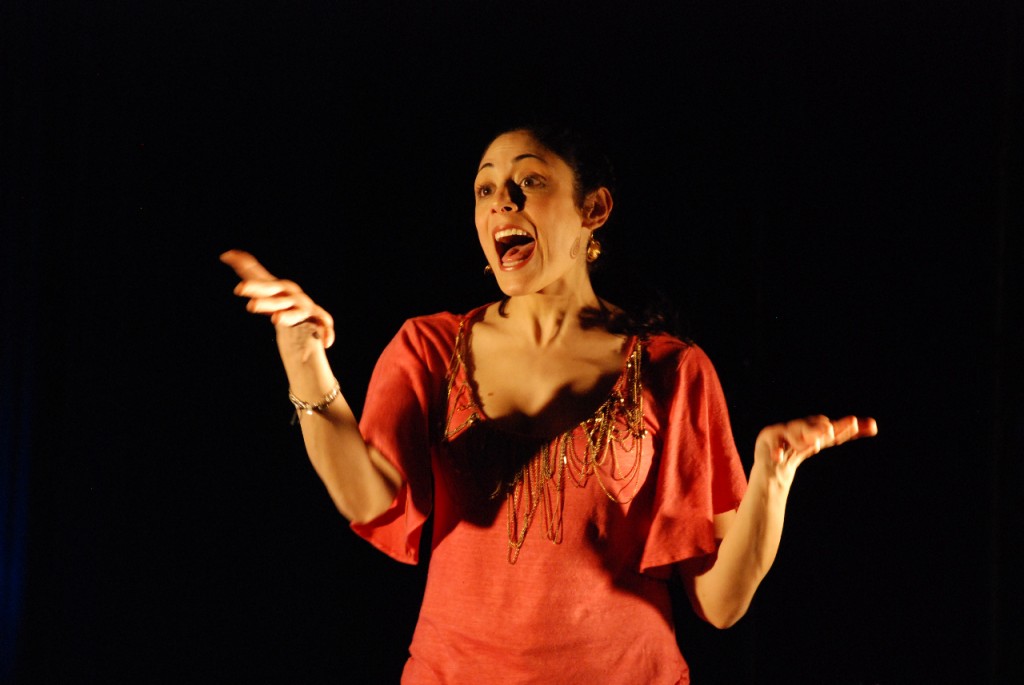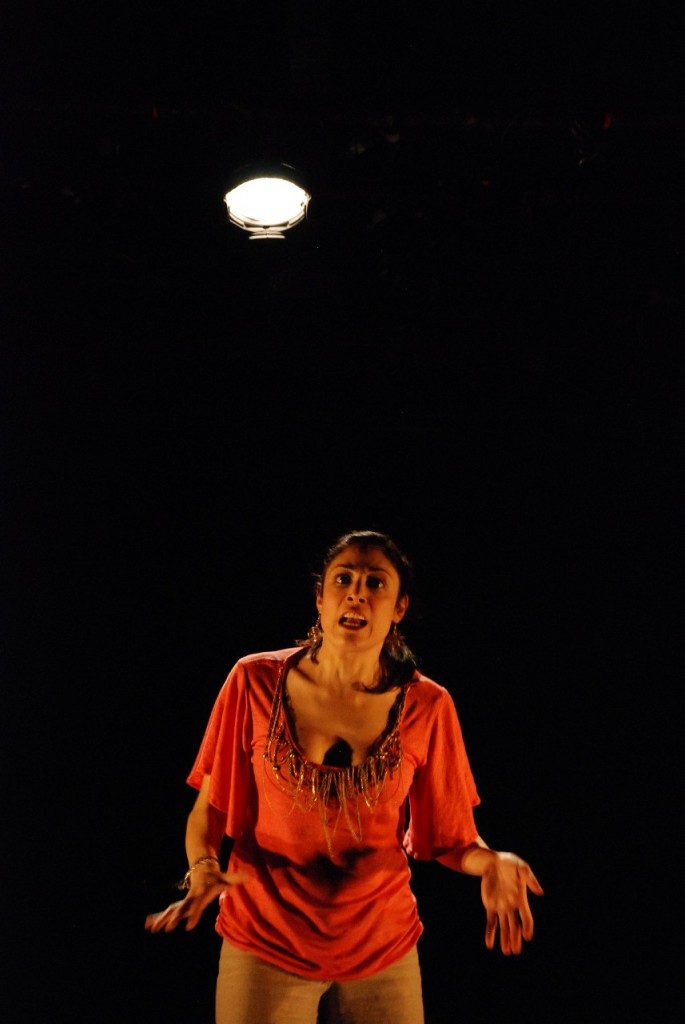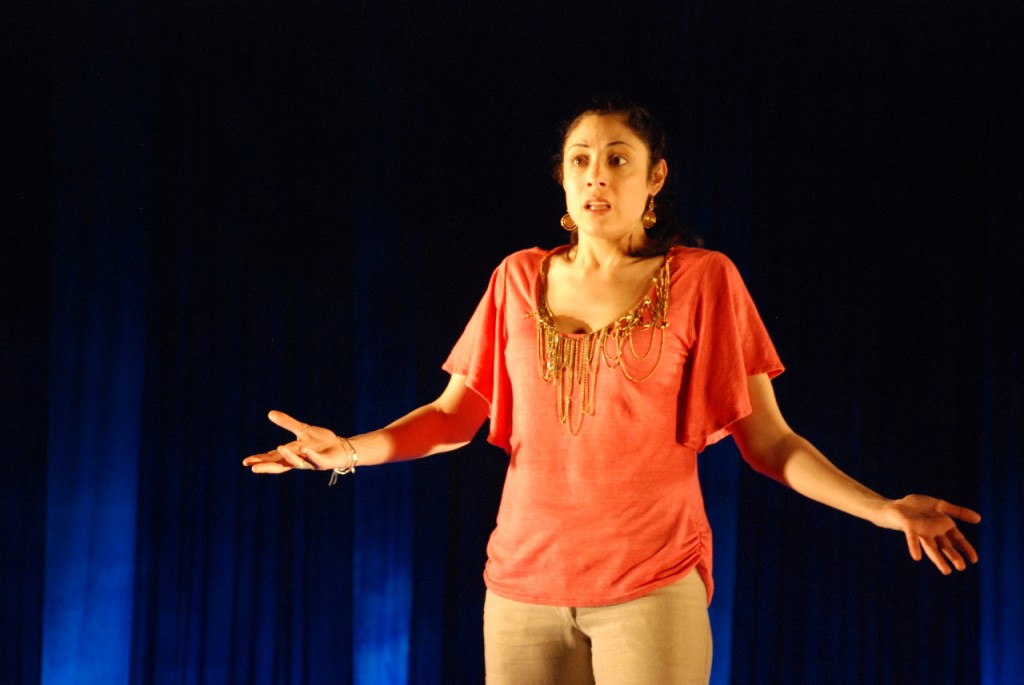
Najla Said in her one-woman show Palestine, being presented this Saturday at 2 p.m. in Engleman Hall on the SCSU campus in New Haven. Photo by the show's director, Sturgis Warner.
Palestine is an autobiographical solo theater piece, written and performed by Najla Said with the directorial and dramaturgical input of Sturgis Warner. On the road, where it’s been a hit at liberal colleges, it’s become something of a rallying point, a place to share insights about modern Middle Eastern culture.
“I wrote it as a play,” Said explains, “and did it as a production at New York Theatre Workshop in 2010, for an eight-week run. I had wanted to continue doing a run, but even before I went into rehearsals I had been approached by colleges about doing it.”
“It’s about discovering my identity—me as a little girl until now, in my 30s, coming to terms with being Arab-American. So it has a strong connection with that [college student] age group. One college after another picked up on it, and it became like a second job. I travel a lot. Luckily, it’s a very portable show.”
Palestine comes to New Haven March 3 when Said gives a 2 p.m. afternoon presentation at Engleman Hall Room C112 on the Southern Connecticut State University campus, 501 Crescent St., New Haven. The event is co-sponsored by the Middle East Crisis Committee and the SCSU Women’s Studies Program. Tickets are $25, $10 for students. Advance tickets are on sale at http://mecc.thestruggle.org/NSPALESTINE
Saturday’s performance is the play’s Connecticut premiere. Throughout March, Said is “doing Palestine in like 20 different places,” mostly colleges.
The single-performance college gigs aren’t quite the same as Palestine’s original New York run, she explained in a phone chat Tuesday night. But the changes have more to do with time, place and audience than with her performance. “The shows are different, but very very similar. It’s intense to do, physically intense. When I was performing it every night, it was exhausting. Now, it’s a little more like a staged reading. I have the book [script] with me, on a music stand.”
Don’t worry, Said isn’t phoning it in. “I wrote it, so I’ve basically been off book the whole time,” she says. Plus, Palestine never really had sets or props in the first place. “The difference is that I don’t use the whiole stage space. This version is the same thing as the [NYTW] version, except that the [playing area] is 4 feet by 4 feet by instead of 12 feet by 12 feet.”
“There’s less lighting. And the Q&A sessions afterward make it very different. College audiences ask certain questions that other audiences don’t.
“Since it’s about growing up in New York, specifically about a Lebanese-American growing up in Brooklyn, audiences in other places react differently to it. I recently performed at a boy’s school in Boston, and they didn’t get the references at all. I think they were a little afraid to laugh, or react strongly. But they seemed to enjoy it.
“I originally did want to do it as a regular theater piece, but now I want to do it this way, at colleges.”
Najla Said has been acting for 15 years, and continues to field a variety of other roles while continuing to tour Palestine.
In 2006, she starred in Heather Raffo’s one-woman tour-de-force about Iraqi women, 9 Parts of Desire, at Seattle Repertory Theatre, which felt “very different, but I felt I knew these Middle Eastern women and wanted to give them a voice. It inspired and encouraged me to tell more stories myself.”
Said does a lot of playreadings, not just in New York but in Boston and elsewhere. She’s debuting a new one-act in New York this spring. In May, she’ll be at the Brighton Festival, appearing opposite Vanessa Redgrave in Redgrave’s adaptation of A World I Loved: Story of an Arab Woman, a memoir written by Najla Said’s grandmother Wadad Makdisi Cortas.
Said’s fortunes as an actor, improved, she says, “since 9/11, when there started being a lot of opportunities to play Arabs. It became a more prominent part of what Middle Eastern actors were asked to do. It becomes limiting, and makes you want to develop your own show.
… and develop it further. “From doing this play, I got a book contract from Riverhead Books for a memoir. So I’m turning it into an actual book.”
The subject matter of Palestine is provocative, even with Said’s careful, personalized touch. Have there been any outbursts or confrontations at performances? “No! No strong reactions like that. I’m sure there are people who’ve hated it, because of my style or whatever, but much less for any political reasons. Which kind of shocks me. I spent my whole life being apolitical, not even wanting to go into this.”
Some of that reticence was due to not wanting to be in the shadow of her late father Edward W. Said—critic, author of Orientalism, Columbia Professor and one of the world’s foremost advocates for Palestinian rights.
Najla Said eased into doing the show by “just being completely honest with myself, just talking about the Middle East. I approached the writing as if I were just talking to people. I’m a New Yorker who talks a lot, neurotically babbles, a child of Woody Allen. Someone said to me, ‘This is a very Jewish play.’”
“I was raised as a humanist. I approach everything as that. I acknowledge Jewish suffering.”
And she takes questions following the performance.



Never resell papers